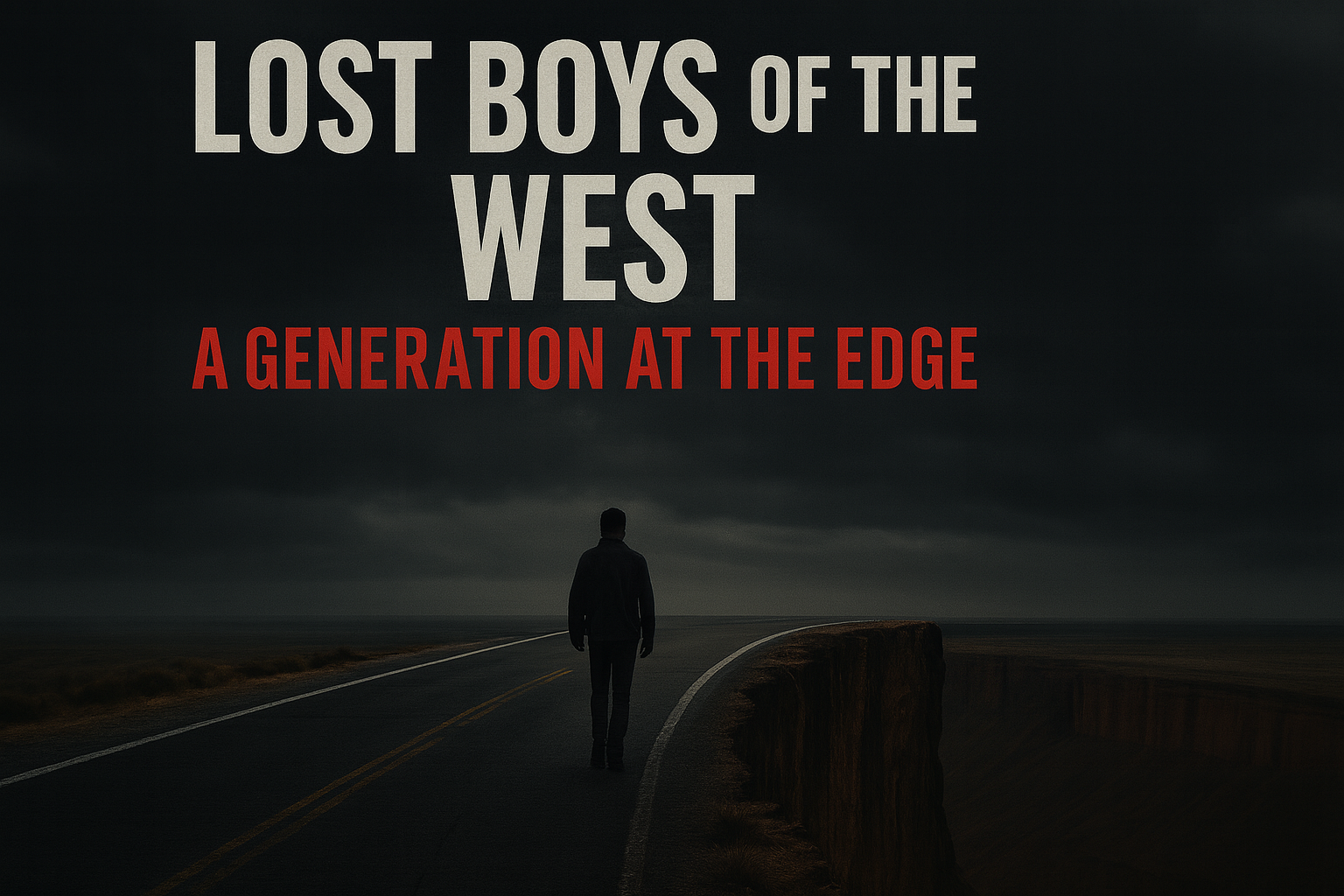At Charlie Kirk’s memorial service, his wife Erika spoke movingly about his mission to “save the lost boys of the West.” She described these young men as those who “feel like they have no direction, no purpose, no faith, and no reason to live.” She added, “Charlie passionately wanted to reach and save the lost boys of the West … He wanted to save young men, just like the one who took his life.”
An Existential Crisis for the West
Make no mistake: this may be the most important crisis facing Western civilization. If we do not prepare men to lead their families and, by extension, their communities and nation, we risk driving a generation into gangs, radical ideologies, crime—or simply their parents’ basements.
How We Got Here
This crisis has been decades in the making—fueled by a complicit media, an entrenched anti-male ideology within academia (often packaged as “toxic masculinity” studies), the glorification of gender dysphoria, and a cascade of destructive public policies. The Biden Administration poured accelerant on these societal fires—undermining Christianity and the family, assaulting traditional Christian values on gender, using equity initiatives and race-baiting to deepen division, promoting mass immigration that operates as asymmetric warfare against Judeo-Christian principles, and casting heterosexual men as the culprit. The 2024 election results underscored the brewing backlash: President Trump roughly doubled his support among Black men under 45, with about three in ten voting for him—a stark sign of deep disaffection and a hunger for change.
Two Cornerstone Studies
Like many of the important societal issues we discuss, the “lost boys” crisis has both personal and policy dimensions. Two works stand out:
- Jonathan Haidt’s The Anxious Generation argues that the “great rewiring” of childhood—driven by smartphones, social media, and overprotected upbringings—has produced a mental-health crisis, especially isolating boys and amplifying anxiety among girls. His research should be required reading for all citizens, especially parents.
- The Centre for Social Justice’s (CSJ) Lost Boys report (March 2025) documents a severe crisis affecting boys and young men across six connected areas: employment, education, family and fatherhood, crime, health, and technology/pornography.
What the Numbers Show
- Work: Males aged 16–24 are now more likely than females to be NEET (not in education, employment, or training), with 550,000 young men in this category—an increase of 150,000 since before the pandemic. Traditional “male industries” have shrunk from 40% of UK output in 1970 to just 16% in 2023, resulting in fewer stable jobs for non-graduates and contributing to poorer marriage prospects and “unemployment scarring.
- Education: Only 60% of boys are “school-ready” at age five versus 75% of girls. Boys lag at GCSE and A-levels, are more likely to be excluded from school, and have seen a steep decline in reading for pleasure.
- Family Breakdown: One in five children has no father figure at home, and nearly half of first-borns live without both parents by age 14 (compared with 21% in 1970). Fatherlessness is strongly associated with poor mental health, higher crime rates, and reduced life chances; 76% of children in custody report an absent father.
- Crime & Victimization: Men make up 96% of prisoners and the vast majority of youth offenders. Yet boys are also disproportionately victims—87% of homicide victims aged 16–24 and over 90% of knife-crime hospital admissions in 2022/23 were male. British boys under 17 now face the highest risk of being victims of criminal exploitation in modern-slavery cases.
- Health & Digital Life: One in four Year-6 boys is obese; steroid use and eating disorders are increasing. Boys aged 15–19 are three and a half times more likely to take their own lives than girls. Almost all 12-year-olds own a smartphone; the average age of first exposure to online pornography is 13; and reports of sextortion have surged—91% of victims are male. Over half of child sexual-abuse cases now involve children abusing other children, with nine out of ten perpetrators being boys. Ninety percent of users of the National Centre for Gaming Disorder are male.
Collectively, these data demonstrate a generation of boys facing compounded disadvantages across work, school, family, health, and digital environments—highlighting the CSJ’s call for urgent policy action. The report stresses that these trends are not inevitable but reflect policy failure. Boys require strong fathers, mentors, and positive role models; a school system tailored to their development; and cultural support for healthy masculinity.
Haidt’s Warning: Entrenchment
Jonathan Haidt describes a self-perpetuating cycle of withdrawal. Push factors (overprotective parenting, reduced free play, rigid schooling) drive boys away from real-world risk and adventure. Pull factors (video games, online communities, pornography) lure them into virtual worlds that offer mastery and escape. Skills for offline life erode, anxiety about social interaction grows, and withdrawal deepens—much like Japan’s hikikomori phenomenon, in which young men retreat from society for months or years. Without cultural and policy change, Haidt warns, many will become permanently isolated and unprepared for adulthood.
A Generation at the Crossroads
Taken together, the findings of The Anxious Generation and CSJ’s Lost Boys reveal a society systematically eroding healthy masculinity and stable family life. Far from addressing the crisis, the Biden Administration has accelerated it through policies that weaken Christianity’s moral framework, normalize fatherlessness, and flood the culture with messages casting men as inherently toxic. Media and academic elites amplify this anti-male narrative, leaving many young men adrift, alienated, and vulnerable to gangs, radical ideologies, or despair.
We are at a crossroads. Either we reclaim the effort to prepare boys to lead families, serve their communities, and steward our nation’s future—or we condemn a generation of “lost boys” to deeper isolation and social breakdown. The data are clear, the warning signs unmistakable—what remains is the courage to act.
What We Can Do
Rewire Childhood for Healthier Development (The Anxious Generation)
- Delay smartphones until at least age 14 and social media until 16; make schools phone-free.
- Reintroduce free play and greater childhood independence so boys develop risk-taking, problem-solving, and social skills.
- Set collective norms so no child is singled out for “lagging” on tech adoption.
- Extend digital-child protections—age limits, parental controls, platform accountability—to reduce harmful content and exposure.
Rebuild Pathways for Boys and Young Men (CSJ)
- Strengthen fatherhood and male role models through mentoring and family-support policies.
- Recognize the cost of fatherlessness: children from fatherless homes face “significantly higher risk of behavioral problems, of going to prison, of abuse and neglect, of drug and alcohol abuse, and so on” (Michael Knowles, Daily Wire).
- Adapt classrooms to boys’ learning styles and revitalize vocational and apprenticeship routes—especially as AI reshapes the job market.
- Support intact families and intervene early in unstable homes; expand male-friendly mental-health and addiction services; reform criminal justice with diversion and rehabilitation; regulate pornography and teach healthy sexual development.
Limit Federal Overreach and Defend Religious Freedom
- Vote for candidates who uphold faith and family—it’s not a popularity contest.
- Resist policies eroding religious liberty and free speech; otherwise, as in parts of Europe and Canada, the Bible and Catholic doctrine may soon be branded “hate speech.”
Bottom line: The “Lost Boys” phenomenon is not inevitable. With courage, policy reform, and cultural renewal, we can restore healthy masculinity, rebuild families, and secure the future of the West.
References
- Memorial Service of Charlie Kirk: Aired on most major networks and Turning Point USA’s platforms.
- Centre for Social Justice. Lost Boys: State of the Nation. March 2025. Centre for Social Justice.
- Haidt, Jonathan. The Anxious Generation: How the Great Rewiring of Childhood Is Causing an Epidemic of Mental Illness. New York: Penguin Press, 2024.
- “Trump about doubled his share of young Black men — about 3 in 10 Black men under the age of 45 went for Trump, roughly double the share he got in 2020.” — AP News, How 5 Key Demographic Groups Voted in 2024: AP VoteCast
- “HATE SPEECH: Sacred Scripture and Church Doctrine — The Bible as Hate Speech?” Boston Catholic Journal.
- Knowles, Michael. “Why Humans Are Not Commodities.” The Daily Wire, Dec. 13, 2023. Available at: https://www.dailywire.com/news/why-humans-are-not-commodities




